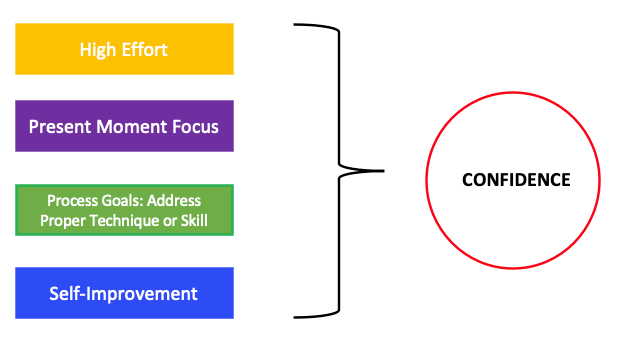Blog
Redefining Success to Build Confidence
by Emily Wright, Ph.D.
Through my applied experiences working with athletes and other performers to enhance the mental side of their game, I have come across a common theme: athletes and performers who ride the tides of emotion from wins and losses and in turn define success based on performance outcomes or how their performance stacks up against others. For example, when I ask athletes and performers to tell me what success means to them, I often get responses like “winning the conference championship” or “getting first place in my race.” While there is nothing wrong with striving for these type of performance outcomes, it can be an unproductive way to define success. When success is seen as only black and white (wins and losses) this can lead to a fragile sense of confidence and fear of failure among athletes and performers.
Confidence refers to one’s belief in their ability to be successful. Athletes and performers know two things about confidence:
- It makes you feel bullet proof - You feel good! You perform automatically and easily.
- It is fragile – Certain situations (e.g., losing an important race) can lead to chinks in your bullet proof vest or even a total collapse of confidence.
Importantly, fear of failure can be a major issue for athletes and performers who lose their confidence in competition. When you are worried about failing or laser-focused on the outcome (thoughts), you may start to feel tense and afraid to run your race or play your game (feelings), which can negatively impact your performance (behaviors) and in turn make you feel less confident in yourself and your abilities. Most of the time for athletes and performers, fear is based on the perception of the importance of a performance or what they assume others think about their performance.
Signs of Fear of Failure
- Focus too much on results or outcomes and have a hard time focusing in the moment
- Become impatient if you don’t perform well and want improvements in training to happen faster
- Feel like your self-esteem is threatened when you don’t perform up to expectations
- Care too much about what others think of you
- Tighten up, freeze, or become tense
- Distracted by end results (instead of being focused in the moment)
To manage fear of failure, develop your self-awareness of it. Understand the specific source of your fear so you can manage it head on. Then, identify the irrational belief and rationalize it into something more productive. In this case, think about how you can use the fear to your advantage.
Fear: If I don’t race well, I’m going to let my coaches and parents down. Rationalization of Fear: My coaches and parents are going to be proud of me no matter how I perform, so I’m going to do my best and try to improve my time relative to the last time I ran this course.
To enhance one’s confidence, we can redefine success in terms of high effort, present moment focus, process goals (proper technique or skill), and self-improvement. The advantage to this approach is that effort, focus, process goals (technique/skill), and self-improvement are in your control. In this case, success isn’t based solely on performance outcomes, which are not always in your control.
Here are some quick tips for how you can redefine success in terms of high effort, present moment focus, process goals (proper technique or skill) and self-improvement.

High Effort: Effort stems somewhere inside you and is coupled with your motivation to succeed. Often, we tend to define effort by a number or percentage. For example, “give 110% effort to your training every day!” I believe a more productive way to define effort is to describe it as a behavior and ask athletes and performers to consider what this might look for them individually on and off the course or field. For example:
What does giving effort (behavior) look like for you in running?
- In training or on race day: positive body language throughout the entire run (head high, shoulders up)
What does effort look like when you are performing your best? Your worst? When reflecting on your effort at your worst, use this to develop a plan to respond if/when you find yourself in a situation that you may not be having your best performance. Importantly, ask yourself, what can I do or say to respond productively?
Present Moment Focus: There is nothing like the here and now! Athletes and performers with the ability to embrace the present moment experience success in the toughest moments. Ask yourself: How can I keep my focus on the present moment (not in the future or past) while I am performing? As a quick exercise, try practicing the following: Identify internal and external distractors that could impact your performance and think about how you could respond productively to them.
Internal - Any mental evasions (e.g., thoughts, feelings, behaviors within yourself)
External - Anything external to yourself (e.g., opponents, score, weather, parents)
After doing this, I ask athletes and performers to tell me which of these distractors are in their control and highlight the take home message that what is in your control 100% of the time is: A.C.E – your Attitude, Concentration, and Effort. Anything that doesn’t fall within A.C.E. can be labeled as an irrelevant distraction that is not helpful to one’s performance.
Process Goals (Address Proper Technique and Skill): It is all too common for athletes and performers to focus their attention on outcome goals, such as winning. While these are valuable goals to strive for, you can’t get to the outcome you want without going through the process. Process goals focus on the actions necessary an individual must engage in during performance to execute or perform well. Thus, athletes and performers can ask themselves: what is important relative to my technique or skill to perform efficiently?
Example: For a runner, this might involve focusing on your upper body and its form when tired or fatigued during a race.
Self-Improvement: Put yourself in the mindset that success is defined according to your own personal self-improvement (YOU versus YOU mentality). For example, base your success on improvement from your previous race. The improvement could be related to your race time, form during hills, body language, response to unproductive self-talk, etc.
In line with the points above, recognize that failure is inevitable (no one is perfect) so it’s important to logically redefine failure. For example:
- Performance is only a failure if you do not give full effort and are not present moment focused.
- If/when failure occurs, embrace it as a challenge, or a key component to helping you improve.
Taken together, athletes and performers can enhance their confidence on and off the course by redefining success in terms of high effort, present moment focus, process goals (proper technique or skill) and self-improvement. By redefining success in this way, you give yourself the opportunity to be in control of your training and racing. Taking small steps now to work towards this definition of success will help you to work toward more productive performances in the future.

